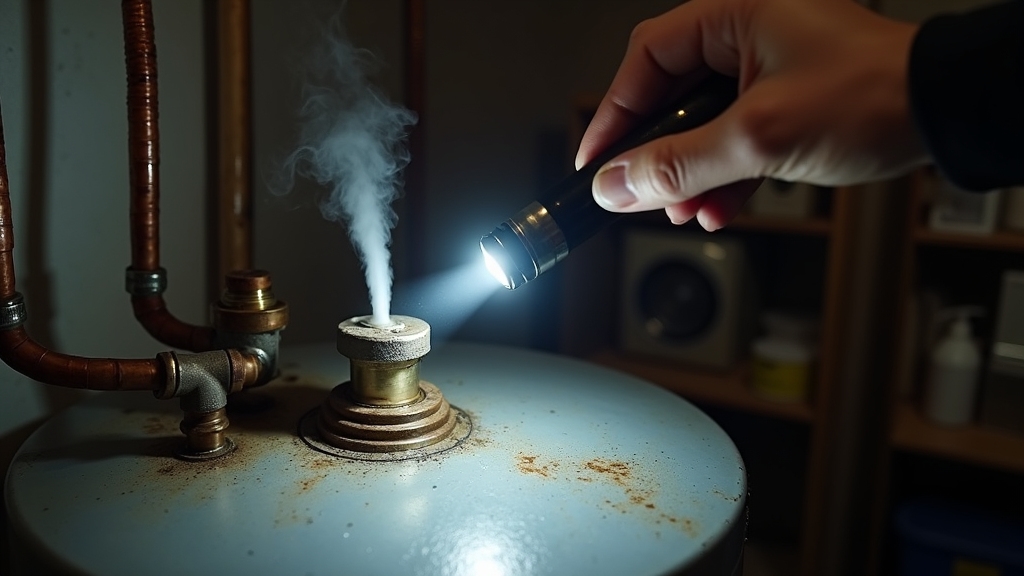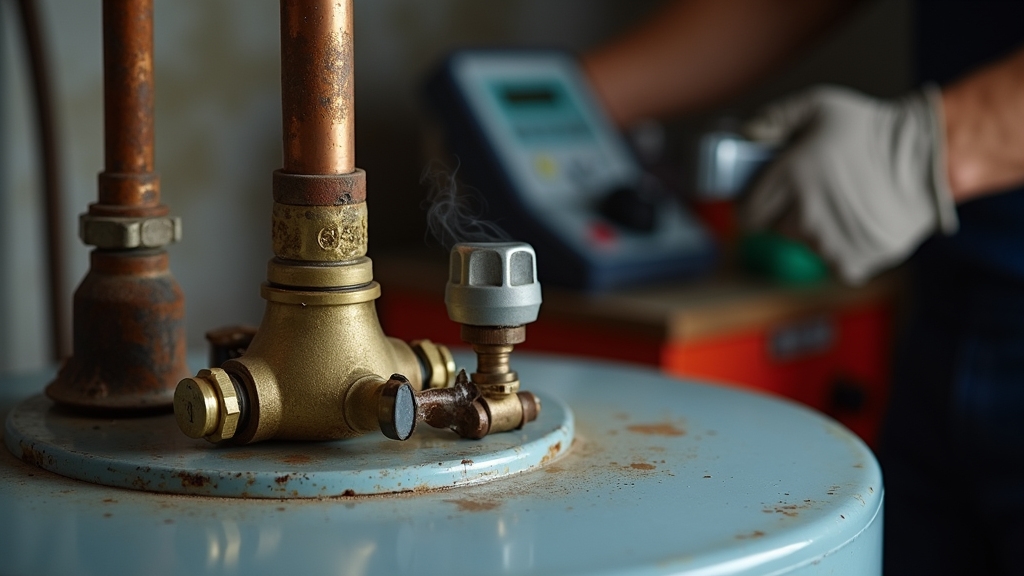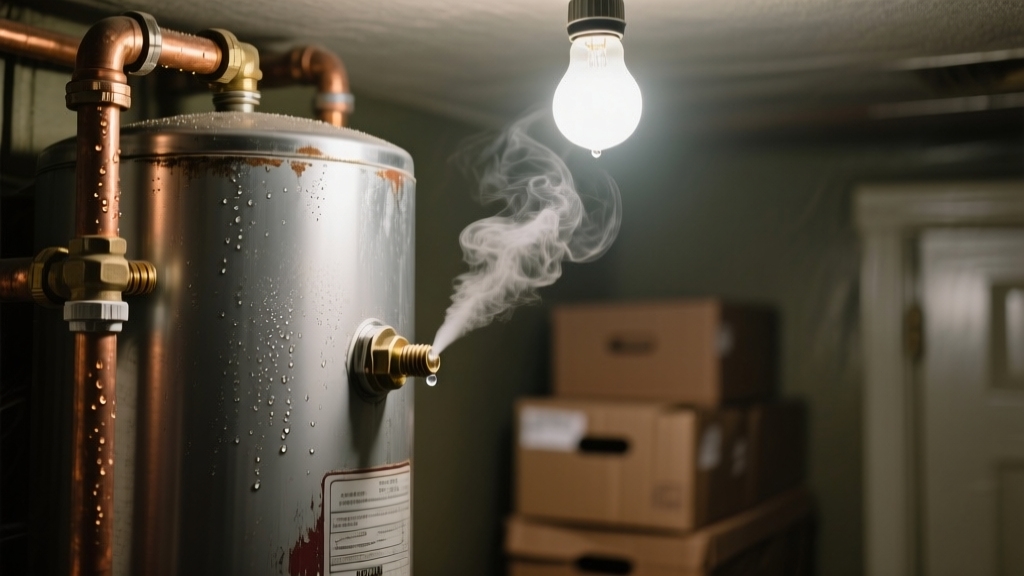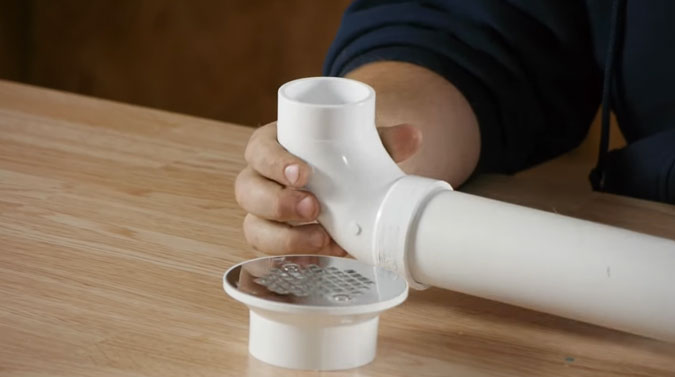If your water heater is making a hissing noise, it’s likely caused by trapped moisture, sediment buildup, or a leak allowing steam or hot water to escape.
This can reduce efficiency and may indicate corrosion or faulty valves. You should inspect for visible leaks, sediment, or valve issues and consider flushing the tank to remove buildup.
Ignoring the noise risks damage and higher bills, but understanding these causes helps you maintain your heater effectively and avoid costly repairs.
Key Takeaways
- Hissing often occurs from condensation contacting hot surfaces after heavy hot water use and is usually short-lived and normal.
- Persistent hissing may indicate internal leaks, faulty drain valves, or sediment buildup requiring inspection and maintenance.
- Visible water puddles, rust, or corrosion near the heater suggest leaks causing hissing and need immediate repair.
- Sediment trapped inside the tank causes hissing and popping noises, reducing efficiency and risking damage if untreated.
- Annual flushing, anode rod inspection, and professional checkups prevent hissing by maintaining tank integrity and proper function.
Common Causes of Hissing Noise in Water Heaters
When you hear a hissing noise from your water heater, it often signals underlying issues that need attention.
One common cause is condensation forming on the tank’s surface after heavy hot water use. Cold water refilling the tank creates moisture that contacts hot surfaces, producing short-lived hissing. Louder hissing correlates with more condensation. Proper maintenance and inspection can help prevent damage caused by moisture accumulation.
Persistent hissing might indicate internal tank leaks or cracks, where escaping water hits hot areas. This is often accompanied by visible puddles.
Sediment buildup at the tank’s bottom traps boiling water bubbles, causing hissing and additional popping sounds, which can reduce efficiency. Removing sediment regularly is important to maintain the pump efficiency and longevity.
A faulty drain valve may leak water onto hot parts, creating sizzling noises. Tightening or replacing it usually helps. Ensuring the valve is properly disassembled and inspected can prevent future leaks.
Identifying When Hissing Signals a Problem
You’ll want to pay attention to how often and how long the hissing happens. If it’s a constant noise, that often signals a more serious problem.
Also, take a look around the heater—are there any visible signs of water like puddles or moisture? Those usually indicate leaks. Persistent moisture may also suggest issues with the cooling system.
And while you’re at it, keep your ears open for any other noises, too. Sounds like popping or rumbling can suggest that there’s sediment buildup affecting the heater’s performance.
If the hissing occurs near the pressure relief valve, it could be the valve releasing excess pressure to keep the tank safe, which is a normal safety mechanism called the T&P valve.
Frequency and Duration
Although occasional hissing after heavy hot water use is normal due to condensation, frequent or prolonged hissing often signals an underlying issue. The size of the sump pit can affect how long water-related noises persist in plumbing systems.
If you hear hissing multiple times daily without significant water use, it may indicate a leak or faulty valve. Short bursts lasting seconds to minutes post-use are usually harmless, but hissing that extends beyond 10 minutes during idle periods suggests pressure or tank problems.
Increasing frequency or duration over weeks points to sediment buildup or tank deterioration. This is because minerals like calcium and magnesium enter the tank with hard water, leading to mineral accumulation.
Hissing only during heating cycles generally relates to sediment or mineral content, but persistent noise unrelated to water draw demands attention.
Monitor the pattern carefully—consistent, long-lasting hissing is rarely benign and typically requires inspection to prevent further damage or failure.
Visible Water Signs
Frequent or prolonged hissing noise often accompanies visible signs of water, which can help you determine whether the issue stems from a leak, condensation, sediment buildup, or temperature effects.
If you spot puddles, moisture accumulation, or dripping on the tank’s exterior, you’re likely dealing with a leak. Corrosion or rust stains reinforce this, especially if water escapes even without recent hot water use.
Continuous hissing at all times suggests a possible tank leak, which requires prompt attention. Leaking pipes or fittings near the water heater can also cause similar symptoms and should be inspected.
Condensation shows as droplets or a thin film that appears mainly after hot water use and doesn’t pool on the floor. This typically occurs when warm, moist air contacts cooler surfaces, causing water vapor to condense.
Sediment buildup rarely causes external water signs but may cause water bubbling or mineral deposits near valves. Over time, this mineral scale buildup can reduce heating efficiency and damage the tank.
Heat effects appear as discoloration, mineral deposits, or rust around seams and joints, indicating vapor exposure. These signs often hint at underlying pressure or temperature issues that need to be addressed.
Accompanying Noises Indicators
When your water heater emits a hissing noise, pay close attention to any other sounds or signs that accompany it. These can help you identify whether the issue requires urgent attention.
If you notice water puddles, discoloration, or corrosion near the tank, the hissing likely indicates a leak or crack demanding immediate repair. Sediment-induced corrosion weakens the tank structure, potentially causing cracks and leaks. Regular inspection of the automatic shut-off valve can help prevent water damage from such leaks.
Hissing with popping or rumbling suggests sediment buildup, which reduces efficiency and requires flushing. Hissing after heavy use may stem from condensation, which is typically normal but worth monitoring.
Continuous hissing from the temperature and pressure relief valve signals system stress and needs prompt inspection. Finally, hissing paired with banging or odors suggests severe internal issues that pose safety risks. Identifying these accompanying noises promptly helps avoid costly damage or failure.
Potential Risks of Ignoring Hissing Noises
If you dismiss a hissing noise from your water heater, you risk serious safety hazards and costly damage. Excessive pressure buildup can cause tank rupture or malfunctioning relief valves, leading to sudden water release, scalding injuries, or even explosions.
Gas-powered units with unnoticed hissing may have dangerous gas leaks, increasing fire and carbon monoxide risks. Overheated water and steam formation elevate burn hazards, especially for children and the elderly. Sediment buildup traps heat inside the tank, worsening these overheating issues.
Sediment buildup and corrosion accelerate component failure and reduce tank lifespan, potentially causing leaks that damage floors, walls, and promote mold growth. Proper maintenance routines can help prevent these issues from worsening.
Prolonged water exposure compromises structural integrity and raises utility bills. Ignoring these signs can result in expensive repairs or full replacement. Prompt attention to hissing noises ensures safety, prevents property damage, and maintains efficient operation.
How to Diagnose the Source of Hissing Sounds?

Hey there! So, if you’re trying to figure out where that hissing sound is coming from, the first thing you want to do is pay attention to when it happens. Is it only after you’ve used a lot of hot water, or does it keep going throughout the day?
That will give you a clue about what might be causing the noise. Installing a sump pump alarm can help detect water issues early and prevent further damage.
Once you’ve got that down, it’s time for a little inspection. Check around the tank for any leaks, moisture, or even sediment buildup. These little things can really help you narrow down the issue.
You might just be dealing with some condensation, a faulty valve, or, in some cases, it could be something a bit more serious. Sediment buildup can create a barrier between the water and heating element, causing the water to boil and produce that hissing noise, so regular flushing is important to prevent this sediment accumulation.
Noise Timing Analysis
Although hissing noises from your water heater can seem alarming, analyzing their timing provides clear clues about their origin.
If hissing occurs right after heavy hot water use, it likely results from condensation as cold water refills the tank. In gas or oil units, moisture buildup can cause crackling sounds, so checking for moisture pooling around the unit is important to prevent damage.
Additionally, heat dissipation methods can influence how the noise manifests during operation. Short, occasional hissing in this context usually indicates normal operation.
Persistent or random hissing, especially when no water is used, often signals internal leaks, sediment buildup, or faulty valves. Hissing primarily at night suggests pressure issues or leaks unrelated to water flow.
Monitor how long the noise lasts: brief sounds point to condensation, while sustained hissing warrants inspection.
Correlate noise with heating cycles and water use to differentiate mechanical faults from electrical or control system problems, considering that cooling methods impact overall system performance.
This timing analysis helps you pinpoint whether the issue is routine or requires urgent attention.
Physical Inspection Steps
When diagnosing hissing sounds from your water heater, begin with a thorough physical inspection to identify visible signs of trouble. Check for leaks or moisture beneath the tank, and examine the exterior for cracks, rust, or mineral deposits.
Inspect all valves, especially the drain valve, for dripping, looseness, or corrosion. Gently tighten the drain valve to see if hissing stops.
Assess sediment buildup by noting rumbling noises, inconsistent water temperature, or sediment discharge from the pressure relief valve. Sediment buildup over heating elements can create hot spots that cause a sizzling or hissing noise.
Look for condensation or steam on the tank surface, particularly near the burner or heating element. Finally, verify water flow isn’t restricted by inspecting supply lines, flex lines, and shut-off valves for damage or partial closure.
Effective Maintenance to Reduce Hissing
If you want to reduce hissing noises from your water heater, regular maintenance is essential.
Flush the tank annually to remove sediment causing boiling sounds. Inspect and replace the anode rod to prevent corrosion leaks. Heat pumps offer more uniform heat distribution which can alleviate uneven heating issues that sometimes contribute to noise.
Check valves and heating elements for leaks and tighten or replace faulty parts. Adjust temperature settings to avoid overheating and condensation.
Routine inspections help catch problems early, preserving efficiency and quiet operation. Additionally, installing water hammer arrestors can help prevent pipe banging noises that sometimes accompany hissing sounds.
| Maintenance Task | Benefit |
|---|---|
| Annual tank flushing | Removes sediment, reduces noise |
| Anode rod inspection | Prevents corrosion leaks |
| Leak detection | Stops hissing, prevents damage |
| Temperature control | Limits steam and popping sounds |
| Routine inspections | Early issue identification |
Professional Repair Options for Persistent Hissing

Since persistent hissing often signals underlying issues beyond routine maintenance, hiring a licensed plumber is essential for accurate diagnosis and repair.
Professionals use advanced diagnostic tools to inspect heating elements, thermostats, valves, and check for sediment buildup or internal corrosion. They safely isolate power and water supplies, preventing hazards while performing repairs.
Typical services include flushing sediment, replacing faulty components, fixing gas supply or pilot light issues, and addressing leaks or corrosion. Following safety precautions is critical during these operations to prevent accidents.
Licensed plumbers follow manufacturer guidelines, preserving warranties and often carry spare parts to expedite repairs. They also provide cost-effective advice, weighing repair costs against replacement based on heater age and condition.
Choosing a professional ensures precise, lasting solutions that reduce recurring hissing and protect your water heater’s safety and functionality. They also perform essential tasks like testing the TPR valve to ensure it functions correctly, which is critical for preventing dangerous pressure build-up.
Impact of Hissing on Utility Bills and Efficiency
Although hissing noises from your water heater may seem minor, they often signal inefficiencies that directly increase your utility bills. Ignoring these sounds can lead to significant energy waste and higher costs.
Here’s how hissing impacts your expenses:
- Sediment buildup forms an insulating layer, forcing longer heating cycles and spiking electricity use.
- Faulty or miscalibrated thermostats cause overheating and excess steam, wasting energy and increasing bills.
- Leaks inside the unit lead to constant reheating, further escalating utility expenses.
Persistent hissing is an early warning of inefficiency, often accounting for up to 18% of your water heating cost. Monitoring and addressing these issues promptly helps restore ideal performance and reduce unnecessary energy consumption.
Additionally, regular flushing to remove sediment buildup is essential to maintain efficiency and minimize hissing-related energy loss.
Tips for Extending Water Heater Lifespan
Hissing noises not only signal inefficiency but can also shorten your water heater’s lifespan if left unaddressed. To extend its life, focus on maintenance, temperature, anode rods, and insulation.
| Maintenance | Frequency/Benefit |
|---|---|
| Flush tank | Annually, twice yearly in hard water |
| Inspect anode rod | Every 1–3 years; replace if 75% corroded |
| Set temperature | 120°F reduces wear and energy use |
| Insulate tank and pipes | Cuts heat loss by 25%–45%, lowers costs |
Routine flushing removes sediment. Inspecting the anode rod prevents corrosion. Keeping temperature steady at 120°F reduces stress and mineral buildup. Insulating the tank and pipes limits heat loss, reducing energy use and wear. Regular professional maintenance checkups can detect problems early and help avoid costly repairs.
Frequently Asked Questions
Can a Hissing Water Heater Cause a Fire Hazard?
Yes, a hissing water heater can cause a fire hazard, especially if the noise indicates a gas leak or pressure buildup.
You should immediately turn off the gas supply and ventilate the area to prevent ignition. Ignoring the sound jeopardizes explosion or carbon monoxide exposure.
Always have a professional inspect and repair your heater promptly to ensure safety and avoid dangerous situations caused by faulty valves or leaks.
Is Hissing Noise Normal in Tankless Water Heaters?
Think of your tankless water heater like a kettle releasing steam. Yes, hissing noise can be normal, especially after heavy hot water use when condensation forms and evaporates.
However, if the hissing is constant or paired with leaks, it signals mechanical issues like mineral buildup or faulty valves. You should inspect regularly and call a professional if the noise persists or worsens to avoid damage and maintain efficiency.
How Long Does It Take to Fix a Hissing Water Heater?
Fixing a hissing water heater usually takes between 1 to 6 hours, depending on the cause. Flushing sediment typically takes 1–2 hours. Minor leaks or valve replacements may need 2–4 hours.
Major repairs like heating element replacement take 3–5 hours. If the tank is leaking badly, expect 4–6 hours for a full replacement. Emergency stop-gap repairs can be done in under 2 hours to prevent damage.
Will Vinegar Flushing Stop Hissing Noises Permanently?
Vinegar flushing won’t stop hissing noises permanently because mineral buildup will eventually return.
It effectively dissolves existing scale, reducing steam pockets causing the noise, but you need regular maintenance to keep it quiet.
Perform vinegar flushes annually, especially for tankless heaters, to maintain efficiency and minimize noise.
Can Hissing Noises Affect Water Taste or Quality?
Imagine sipping water that tastes slightly metallic or off. Hissing noises themselves don’t directly change water taste or quality, but they often signal sediment buildup or leaks inside your heater.
These issues can introduce minerals or rust, subtly affecting flavor and safety. So, if your heater hisses persistently, it’s wise to inspect and flush it.
Doing so maintains clean, fresh-tasting water and prevents contamination risks.
Simple Maintenance Steps to Prevent Costly Repairs
If your water heater is hissing like steam escaping a kettle, don’t ignore it. This noise often signals sediment buildup or pressure issues that can reduce efficiency and hike your utility bills.
Regular maintenance, like flushing the tank and checking the pressure relief valve, can keep things running smoothly. When in doubt, call a professional to prevent costly damage.
Staying proactive guarantees your water heater works efficiently and lasts longer.


